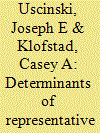| Srl | Item |
| 1 |
ID:
126344


|
|
|
|
|
| Publication |
2013.
|
| Summary/Abstract |
In May 2012, political scientists learned of efforts by representative Jeff Flake (R-AZ) to eliminate political science funding from the National Science Foundation (NSF) budget. The American Political Science Association (APSA) was caught off-guard, and concerned political scientists scrambled to contact their representatives and urge the amendment's defeat. Flake's initial effort to cut funds overall from the NSF was defeated, but a second measure, specifically to keep the NSF from funding political science, passed only hours later. This was the second time in three years that legislators targeted the NSF Political Science Program. Although these measures have been sponsored and widely supported by Republicans, some Democrats have supported these measures as well. This article examines the vote on the Flake Amendment to understand why individual representatives voted for or against cutting NSF funding for political science research.
|
|
|
|
|
|
|
|
|
|
|
|
|
|
|
|
| 2 |
ID:
100788


|
|
|
|
|
| Publication |
2010.
|
| Summary/Abstract |
In October 2009, political scientists learned of a Senate amendment sponsored by Tom Coburn (R-OK) that would eliminate political science funding from the National Science Foundation budget. The American Political Science Association condemned the proposed amendment, and concerned political scientists contacted their senators to urge the amendment's defeat. On November 5, 2009, the amendment was defeated 36-62 after little debate. This article examines the vote on the Coburn Amendment to understand the role that senators' personal, constituency, and institutional characteristics played in their votes. Logit analysis reveals that even after controlling for party, several factors significantly predict the vote, including the number of top-tier political science Ph.D. programs in the senator's state and whether the senator graduated with a bachelor's degree in political science.
|
|
|
|
|
|
|
|
|
|
|
|
|
|
|
|